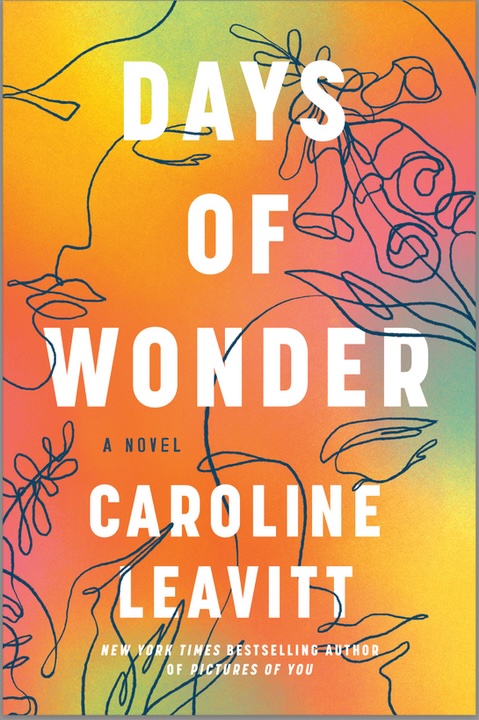
Today’s post is by author Caroline Leavitt (@carolineleavitt).
I’m sitting at a table talking to a friend when they tell me this astonishing, deeply compelling story about what happened to them when they were 15 and they had committed a murder, and yes, they did it, and yes, they served time. Early released, desperate to be forgiven, my friend then created a whole new identity and began to live a new life. Until their forties, when they were outed, losing friends and family. They had to start anew and create yet another identity.
Of course, I’m stunned and shocked by this story, but I’m also deeply sympathetic because I absolutely know this person is a good person and this story is raising all sorts of questions for me. Because I’m a writer, later when I’m alone, I can’t help but think: God, this would make a great novel. Already the idea is spinning in my mind, trailing off into subplots and characters, but then I stop myself cold.
Because what my friend gave me was a private confession. What if my friend doesn’t want me to use the story? What if my friend says yes, except they want to read it first, and then they decide it’s not told the way they see it? I agonize that I am invading my friend’s privacy. I worry that I could lose a friend, that I could even be sued.
And still, the story haunts me.
Remember the story of the bad friend that was making the rounds, about a writer who took her friend’s idea about donating a kidney for altruistic reasons and used it for a story without asking permission and all hell broke loose? This was hotly debated in the literary community, and in the end, one error was that the author had plagiarized words from an email. But the story itself was up for grabs.
Or was it?
I couldn’t let go of my friend’s story. I loved this person, but I didn’t want to hurt them or invade their closely guarded privacy—which is why I’m not revealing more details about them right here.
I decided that I would totally change the story, keeping only the kernel that had snagged me—the idea of forgiveness, of guilt and innocence, and what they mean. I wanted to write about someone reinventing themselves and then being caught at it.
It took me six months to craft an outline which became my new novel, Days of Wonder. Instead of one person, I now had two fifteen-year-olds living in different parts of a different city, and for the novel it was New York City. They were Romeo and Juliet lovers, a wealthy boy and a girl from a single seamstress mom. Instead of a murder, I changed it to an attempted murder. I changed everyone’s description; every action was different. By the time I finished, I had transformed the initial story so completely that it had, I hoped, a life of its own. My friend has not read the book, but I have given it, with no explanation, to a mutual friend. She liked the characters, liked the story, and when I asked her if she thought the characters were too recognizable, she blinked hard. “To whom?” she said, and then I relaxed.
Of course there are rules. Never ever use real names. Never describe someone in a way that they are recognizable, especially if you are writing about something damaging like drug addiction or crime. Don’t use the same city, or the same time period, if you can help it. Change everything about the person, from their name to their height to the size of their shoes. If they live in a walk-up, make it an elevator building. Brown hair? No, no, it’s now red. Someone works at Mass General Hospital? Make up a name of a hospital. It’s fiction, you can do that.
Should you ask someone before you write about their life?
You can, but be forewarned: that doesn’t always protect you. The author of The Help, about black maids in the 1960s, gave a draft of her book to her childhood maid before it was published. But she wasn’t sued until the book came out, and the case was dismissed because the maid who was suing had had months to read the book and hadn’t.
One time I decided to write a personal essay about a terrifying summer when my then sister-in-law was busy sleeping with her husband’s shrink and my own first marriage was collapsing. “You have to write about it!” my sister-in-law told me. Not only that, but she gave me more details to use. I told her of course I’d change her name, the city, the descriptions. She was happy when the story was published in New York magazine. Happy, too, when I got to go on the Today Show (twice!) to talk about it.
But when I got a film option, suddenly the stakes were high enough for her to want to sue. She threatened me and I had to get an attorney. But again, because she had read the piece and approved it, because she had seen me on the Today Show, she could not win. Still, it took a few years for us to patch up our friendship. But we did.
Of course, you are safest when the person is dead. In Days of Wonder, wonderful stories from my mother began to seep into the narrative. My mother never wanted me to write about her ever, but after her death, I wanted to feel closer to her, so I embellished all her stories about growing up in an Orthodox Jewish home, a world she had loved, up until her father, the local rabbi, died suddenly and she lost her faith. It made me feel closer to her, as if I were honoring the love I had for her.
Think about your motive. Are you trying to even a score? That’s always a bad place to write from.
Is the story just too good to let go? Then dissect the elements to find the parts that really engage you. And then change it as much as you can.
I write about what haunts me, what I need to rewrite into fiction in a way that helps me understand not just what happened but why. I keep revising and revising, and if I do the revisions right, the stories I’m telling will sound like they came from the characters I’ve created, and not from the real people at all—and readers will simply be immersed in a great story, rather than a roman a clef. Good and careful writing teaches us that writing about the stories of others is really about writing our own.
Caroline Leavitt is the New York Times bestselling author of 13 novels, most recently Days of Wonder, a Most Anticipated novel from Oprah Daily, Bustle, Zibby Owens Magazine, SheReads and more. She is the recipient of a Midatlantic Arts foundation/New Jersey Foundation of the Arts grant for parts of this novel, as well as being a prior New York Foundation of the Arts Fellow and she was longlisted for the Maine Readers Prize, and a Sundance Screenwriters Lab finalist. A book critic for People and The Ethel, she is the co-founder of A Mighty Blaze and a blog/columnist at Psychology Today. Her work has appeared in Modern Love in the New York Times, New York Magazine, Salon, The Millions, Lit Hub, Publishers Weekly, Poets & Writers and more. Visit her at www.carolineleavitt.com


Such a lovely nd revealing essay. Can’t wait to read your new book, Caroline
Thank you so much, karin!!
I just finished the first draft of a memoir about a trip I took nearly 48 years ago. I am unable to contact people I met to get their approval or feedback. One person in particular—who attempted sexual assault—doesn’t come off well. I can disguise name and distinguishing physical features, but other characteristics play heavily in my story. Based on his age then, he’s probably in his late 60s now. I’m unsure about the safety of using that (important) scene. Do you have recommendations for resources? Thank you.
Here’s guidance from a lawyer.
https://helensedwick.com/how-to-use-real-people-in-your-writing/
Thank you, Jane. This is very helpful.
I can relate to hearing a story so good it haunts you. Kudos for taking the time and effort to distill it to its essence and rework the details.
In the interest of learning how to navigate such a situation, I’m wondering if your friend knows what you did, as she may read this blog post.
And even is she doesn’t read this post, might she recognize the kernel of the story? Does the mutual friend who read the book know of the other friend’s background?
She does know and gave her blessing as long as I changed every detail. Which I did.
Thanks for responding. That’s a generous woman.
Thank you! I’ve been wondering about the new Netflix series “Baby Reindeer,” which is based on what really happened to the lead actor / writer of the series. It’s become so problematic that he and the actress playing the character based on the woman who stalked him have had to make announcements to the public about not trying to find the real identity of that woman. How did they not foresee this issue?
According to a recent article in the Hollywood Reporter, this woman is planning to sue him and Netflix.
What? I didn’t know this. I thought if you changed the name, the appearance, the profession, the city–maybe the issue was that the writer said this was an absolutely true story, but then I wonder, why didn’t that film abuser sue?
This is all very scary. Years after a relationship ended, I wrote a personal essay about a boyfriend who had monitored what I ate until I was down to 95 pounds. I was grieving the death of a man I really loved and had thrown myself into a relationship so I could stop grieving. (ha ha.) I knew if I left him, I’d grieve, so I stayed. I changed his name. his appearance, his profession. And the essay came out in an anthology. Random House called me up to say he was suing them. He insisted we shared friends (we never had, and it was 20 years ago.) He insisted the giveaway was the Upper West Side. (I said everyone lives on the UWS). Since I never mentioned his profession, there was no damage to him. Since we had no friends together, there was no damage. He had no case. But it was scary. And I have not heard from him since, thank God.
Scenario two. I had a very strange summer years ago with my first husband who was cheating on me, my best friend and sister-in-law who helped him cheat, and my sister-in-laws strange relationship with her schizophrenic husband’s shrink–she fell in love with him, he promised to marry her. You know the drill. It all ended terribly and tragically and I wrote about it, but before I did I asked my friend if I could. She said yes, absolutely yes. I got on the Today Show about it. Twice. She watched and cheered me on. It got in New York magazine. More cheering. But then it got a movie offer and she sued me because it was her story. I hired an attorney who said because she had known about this story from the start, she couldn’t sue. (this is sort of what happened with THE HELP–the maid had had the manuscript before it was published and hadn’t read it–but when it was a huge success, she sued.) Funny fact–we became close friends again.